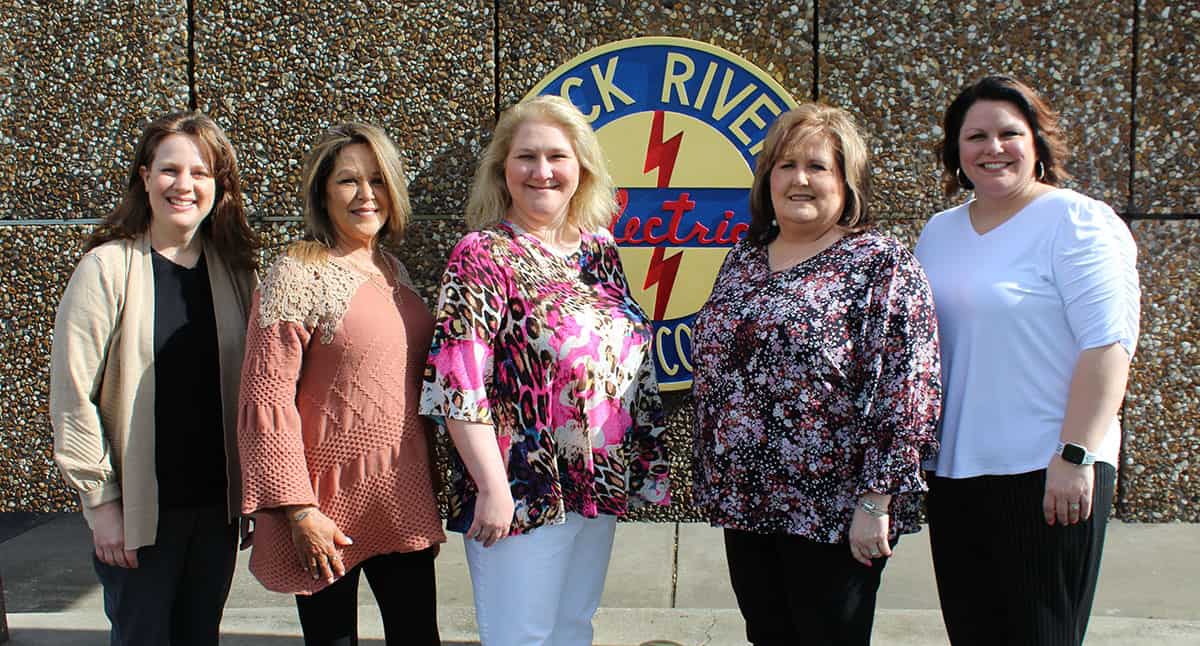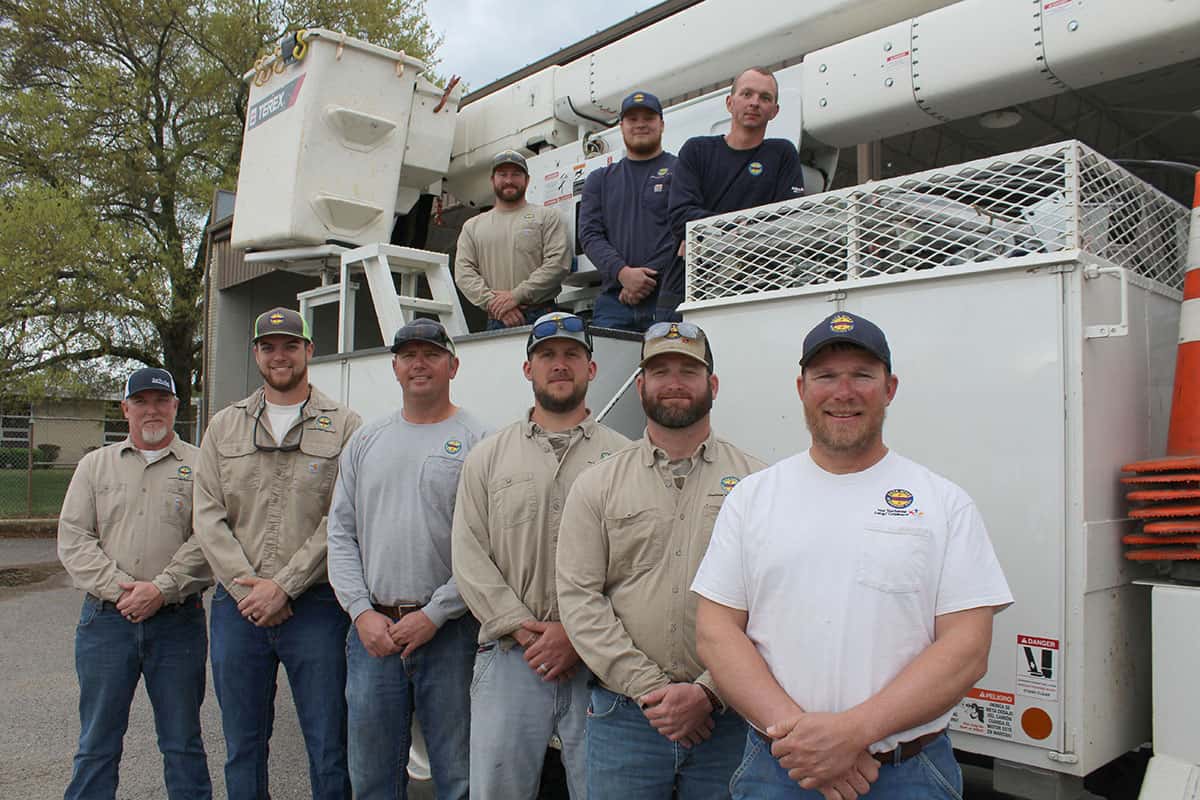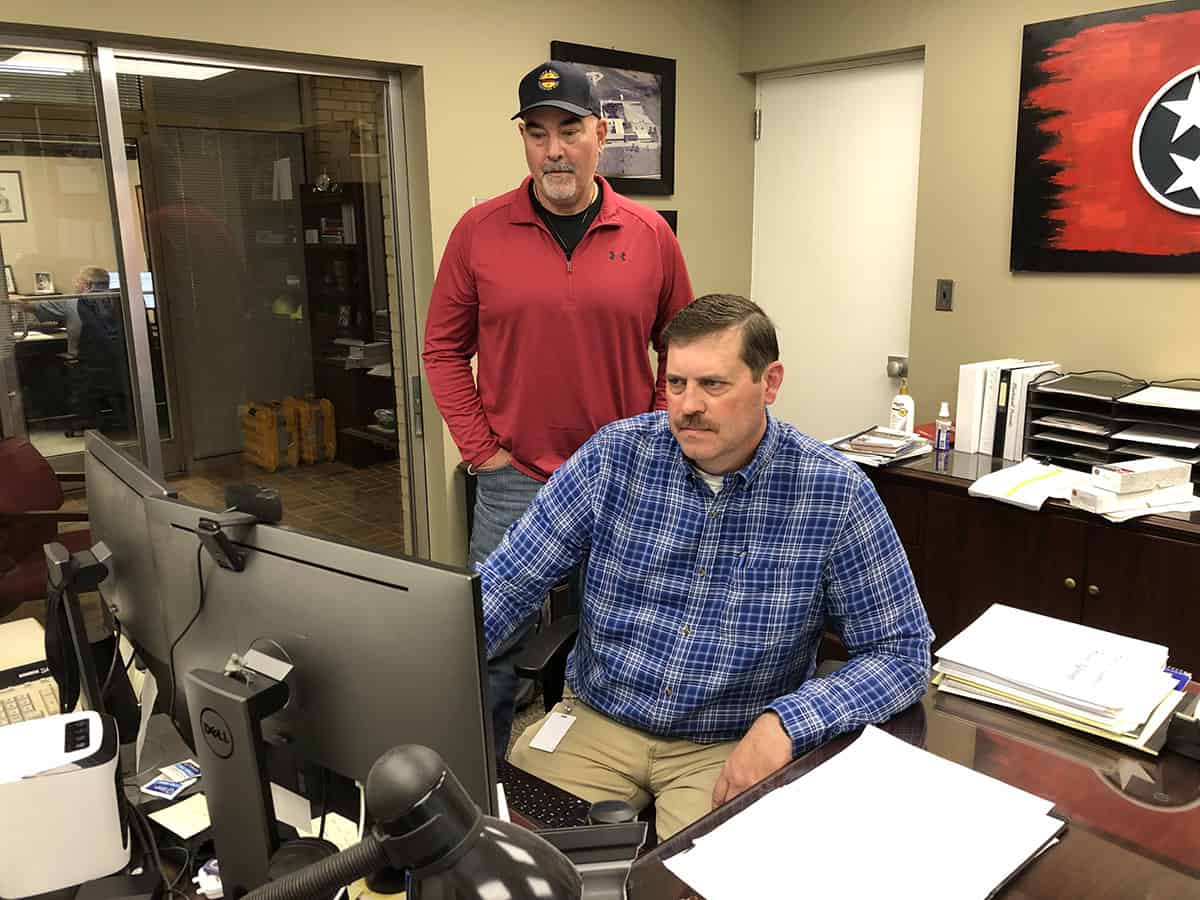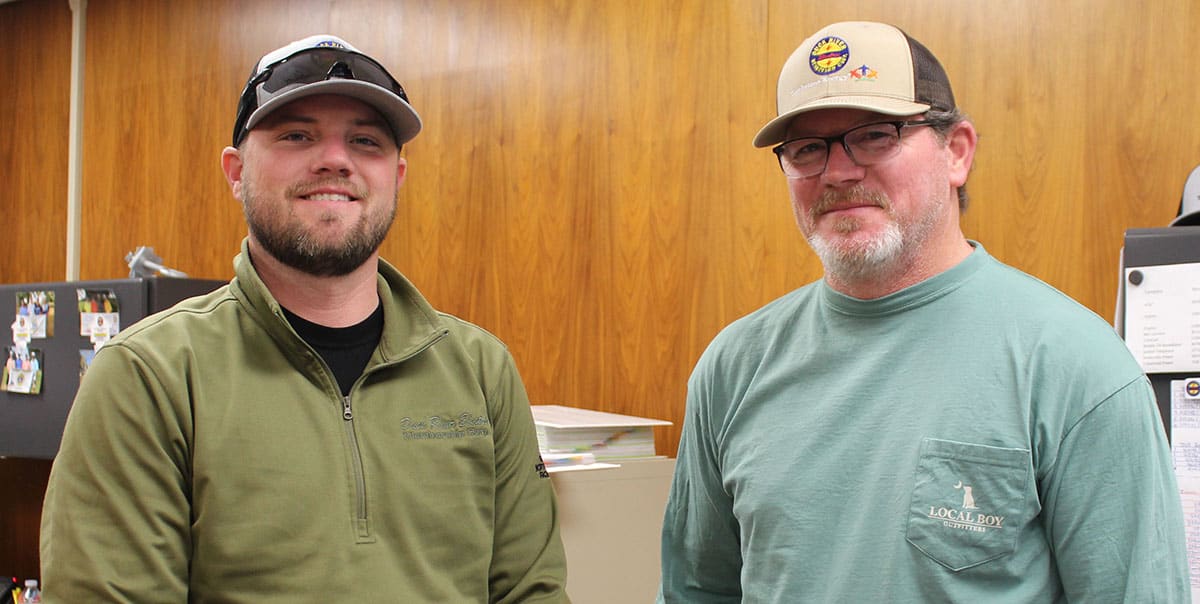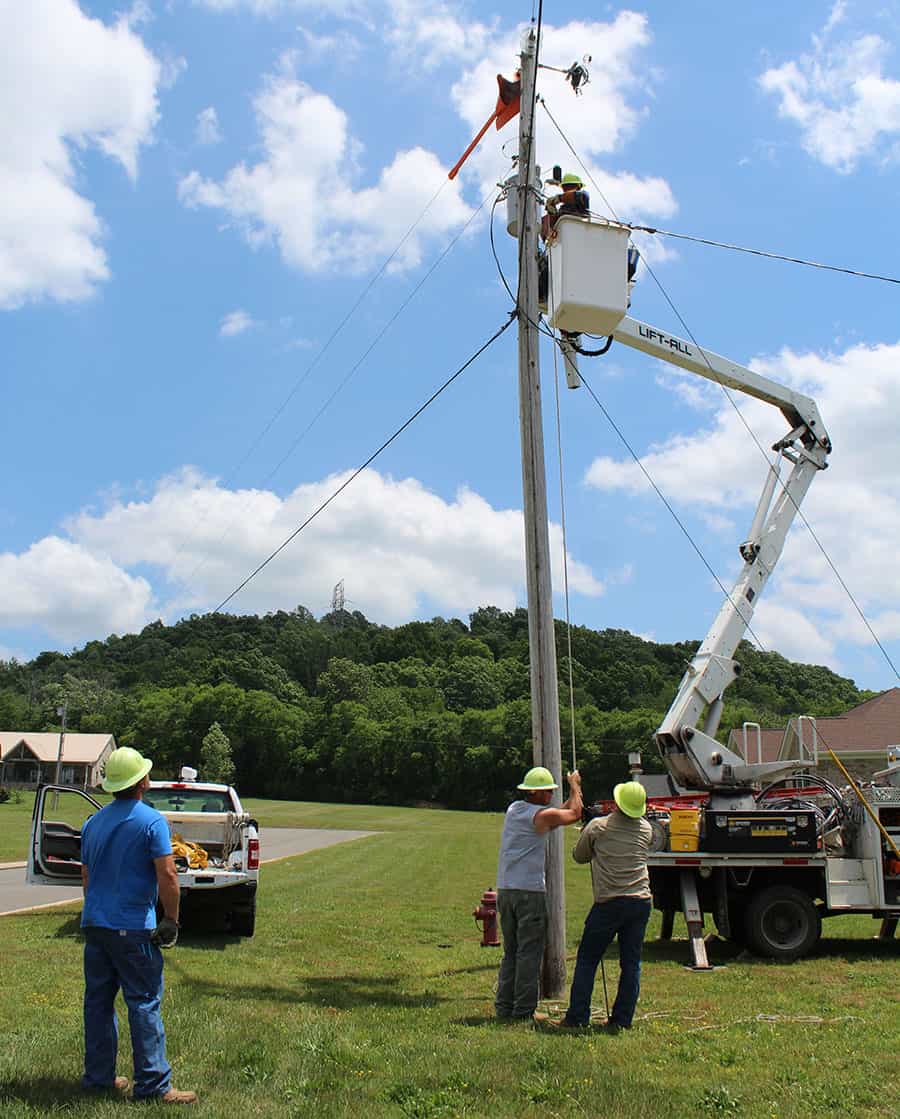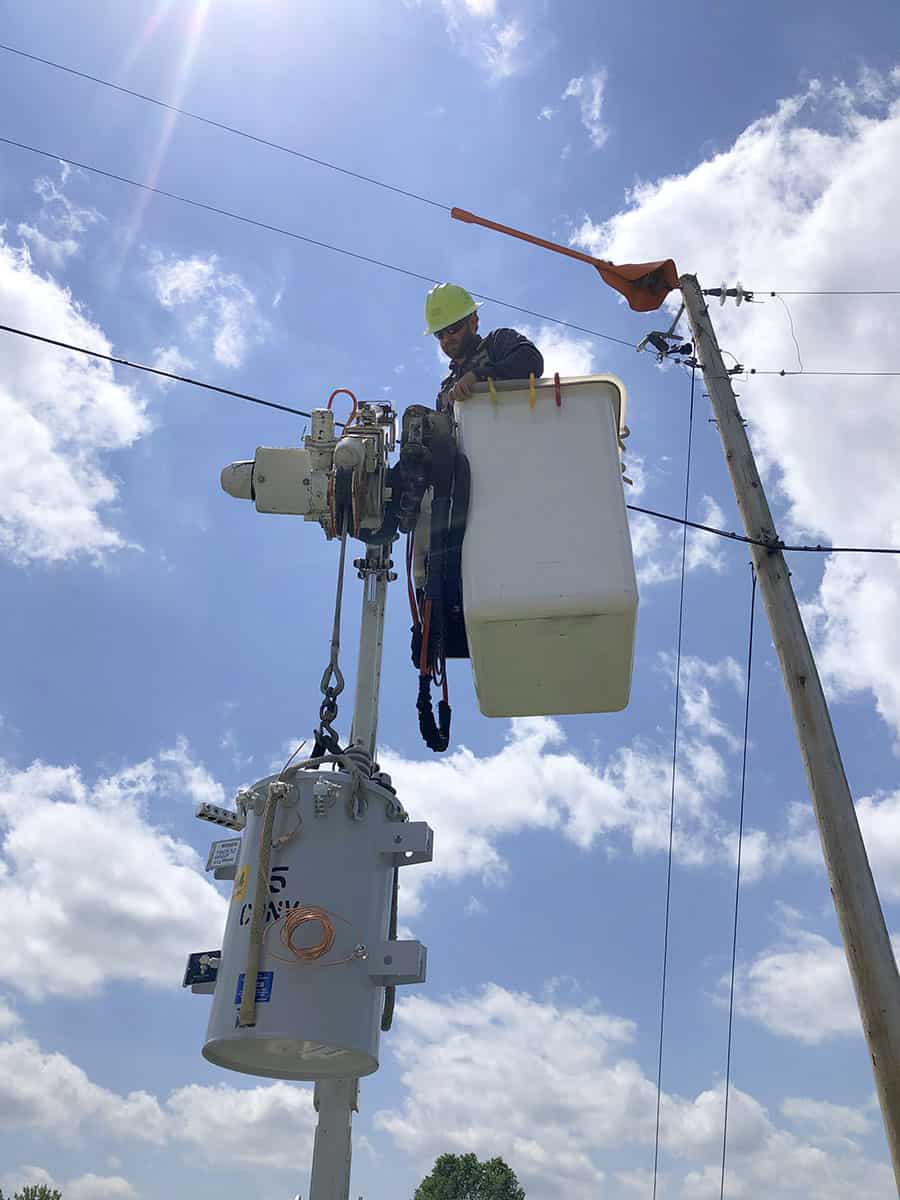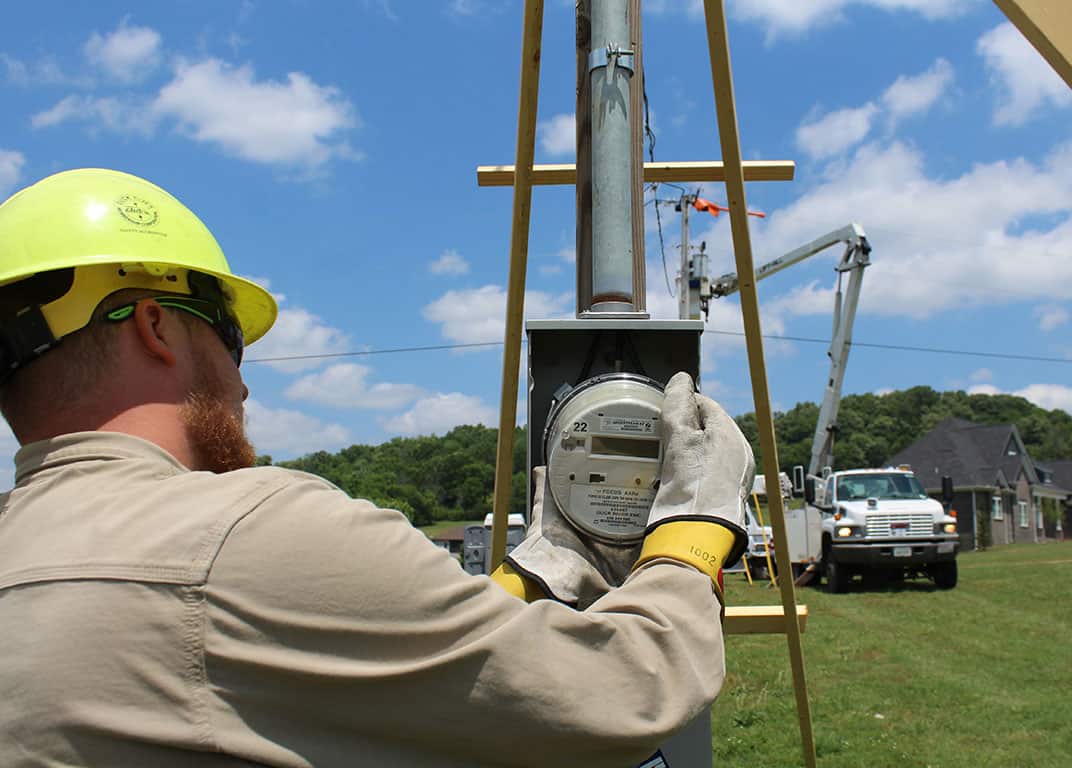Bedford County’s rolling hills and rural country landscape include the charming, small towns of Bell Buckle, Normandy, Unionville, and Wartrace. Smaller communities, to mention a few, include interesting names such as Raus, Wheel, Rover, Flat Creek, Bugscuffle, and Pleasant Grove.
Established in 1936 to serve rural areas of Bedford County, the original Shelbyville office was located near the town square. The office moved to its current Madison Street location in 1966.
Leading the team in Shelbyville is Drew Lane, senior director of the Shelbyville operations, who joined DREMC in 1995 as a system field engineer. A few years later, Lane became Shelbyville’s district field engineer, and in 2019 he was named district manager. In his current role, he supervises daily operations in the Shelbyville and Lynchburg offices plus the System Operations Center, which remotely monitors the entire DREMC system.
“They all bring their A-game to work and do what it takes to care of the members,” Lane said about the team. “Duck River’s members aren’t only members. They’re friends and family, and we have built good relationships over the years with them. On many occasions, members have even offered us their tractors and chainsaws to assist with clearing debris after a storm while we work to restore power.”
“Members come to Duck River Electric during big events in their lives,” Shelbyville Office Manager Tara Groce states and explains. “They come to us when they’re moving out of their parent’s home for the first time and need service turned on or when they’re buying or building their first home. Those are exciting times, and we are proud to be a part of helping them through the process.”
Groce began working at DREMC in 2010 and for the past two years has supervised a team of five, which includes the member service representatives (MSRs) in the Shelbyville and Lynchburg offices.
“When I was younger, both my granny and daddy paid their electric bills here,” recalls Groce. “Driving by the Shelbyville office one day, my dad even said to me, ‘Right there is where you need to work.’ At the time, I didn’t know anything about Duck River Electric other than this is where you paid the bill. Now, I’m excited to be here and to be a part of a company that holds high standards for serving others.”
Brenda Wilson describes the role of an MSR as being like a welcoming committee. “In most cases, the MSR team is the first point of contact at Duck River for new members as they apply for electric service,” Wilson said. “When newcomers to the community visit our office, they sometimes ask about where they go to connect other services like water and cable TV and how to schedule trash pick-up. We are always happy to guide them to the other service providers in the community.”
“One of the best days I’ve had was witnessing the generosity of our members,” said Sally Redd, an MSR. She shares that as one MSR was advising a member where to apply for financial assistance through DREMC’s Project HELP program, another member, who was also in the lobby and overheard the conversation, stepped to the counter to pay the electric bill for the member in need. “Getting to know the members we serve and witnessing the goodness in people makes my job very rewarding.”
Carol Brown shares that MSRs have the opportunity to assist members with better understanding their electric bills and how different appliances can affect the bill amount. “Many times, members will say ‘Now that you’ve explained it, I get it,’” she said.
“We are always glad to assist members with learning how to lower their bills by being more energy efficient and how to use DREMC’s mobile app and daily energy use alerts,” said Sarah Shannon, an MSR who worked for several years in the DREMC Manchester office before coming to Shelbyville last year.
Tripp Womble, district engineer, and Christian Edmondson, field engineer, work together to meet with members building, moving or retiring electric services and ensure that they achieve the lowest construction costs for the cooperative and for the member. A DREMC engineer meets face-to-face at the member’s property, and in doing so, being helpful and making a good, first impression on the member is important.
“I grew up in Bedford County and enjoy making sure our members are taken care of,” said Edmondson. “As a field engineer, I mostly work outdoors and enjoy seeing areas of our county that I wouldn’t normally get to see unless my job takes me there.”
Womble has been with DREMC for 15 years, beginning his career with the warehouse team. “Learning the construction materials needed for setting new poles and building lines while working in the warehouse has been beneficial to me in the engineering role,” said Womble. “There are a lot of variables when building electric service to a new site. The challenge is that no two construction jobs are the same. Trees, terrain, angles, and distances are just a few of the considerations that go into reaching the best possible cost of construction to benefit the members and the cooperative.”
“We’re linemen, but we’re also public servants of the community,” said Benge Dunivan, working foreman, who has spent 17 years working in the field. Dunivan came to DREMC in 2012 with previous experience in line work at a neighboring utility and says that linemen depend on each other’s knowledge and experience. “We are trained professionals that work together and learn from each other.”
Dunivan describes, “No two days are the same, and many times we have to make decisions on the fly, especially during storm recovery. We could fill a book with the experiences we have had as linemen.”
Heath Nave, working foreman, began working in the line crew in 2003 after spending eight years working as an electrical contractor. “This job is rewarding,” he said. “What we build with our hands brings electricity to our community. It means a lot to us to receive a thank you note or nice comments on social media following an outage.”
“Being a lineman is just something in you – you’ve got to love it with your whole heart to do this job,” said Operations Supervisor Jeff Hockaday, a seasoned member of the Shelbyville team. Hockaday began his career in 1988 and said that his 34 years at Duck River have gone by fast.
“These guys depend on each other every day,” said Hockaday. “We are a team, and we literally have each other’s lives in our hands when working on the power lines. It’s a huge responsibility, and it makes us a tight group. Whether we’re working here or away on storm restoration in another town or state, we take care of the crew we work with.”
“Over the years, I’ve missed a few birthday celebrations, ballgames, and at least three Christmases with family due to outage restoration work,” he shares. “As employees of Duck River, we have a responsibility to take care of all who depend on us.”
Lucas Burk joined DREMC in 2016 as a dispatcher and is now a level four apprentice. Burk has farmed for years and enjoys working outdoors, which was one of the benefits he likes most about being a DREMC lineman. “I was actually riding a tractor on the farm when I got the call from Duck River about the dispatcher job,” he recalls. “Working as a dispatcher helped me learn a lot about DREMC’s service area, about outages, and assisting the line crews from the dispatch center was great.”
When the opportunity came for Burk to join the line crew, he received his climbing gear just two days before his first day of lineman school. “I remember thinking that I didn’t know if I would ever be able to climb a pole,” shares Burk. “Now climbing is just part of the job.”
Will Davidson, a lineman for three years, laughs and said, “At first, climbing a pole feels so unnatural. It’s almost like riding a horse for the first time. It’s weird, and you’re bow-legged until you get the hang of it.”
“The most challenging time I’ve had so far is definitely restoring power after the last ice storm,” said Davidson. “We worked long hours, and conditions were dangerous with falling trees and limbs. Power lines were down everywhere.” As Davidson also tells, “Even walking on the icy roads, yards, and hills was dangerous. I fell a lot!”
Nave admits that those times are disheartening and adds that a lineman must have grit. “I’ve said many times, ‘You ain’t defeating me today!’ when a line goes back out after we just repaired it.”
Robert Amos and Jay Anthony joined DREMC in Dec. 2021. Although new to DREMC, both bring past lineman experience to the cooperative. “I somewhat fell into the lineman job after first working as an electrician,” said Amos. “I became interested in line work after watching linemen connect the new electric services to the homes that I had wired. Duck River is a close-knit team, and I’m glad to be a part of it.”
“It can be overwhelming,” said Anthony, describing how it feels to see how badly the electric system is damaged by a severe storm. “What keeps me going is that my family is home waiting on me to get back to them.” When asked about working outdoors during the extreme cold temperatures, he smiled and replied, “It’s just another day at the office.”
Nave says that the job of a lineman is dangerous, and in fact, it’s one of the most dangerous jobs in the nation. He recalls working 50 hours straight during the 1998 ice storm while employed as an electrical contractor. “The improvements in safety procedures and storm work have made positive impacts on a lineman’s career and helps to ease our worries and those of our families.”
According to Lane, much work and planning also go on behind the scenes during outages. “Forecasting the storm’s path across the service area, planning the work, and staging our crews, prepping trucks and materials, are all tasks that we must handle in addition to answering calls and repairing the electric system. During times like this, each employee has an important role to play.”
Taylor Byrd joined the Shelbyville DREMC team in 2019 with six years of previous experience at a neighboring electric utility. Over the years as most linemen do, Byrd, too, has joined in efforts to rebuild electric systems destroyed by tornadoes, hurricanes, and ice in the southeast. “Working as a lineman is truly a brotherhood experience,” he said. “I love working outside, and when we’re faced with rebuilding miles and miles of electric line, the adrenaline of it all keeps me going.”
“I try to imagine what it was like 70 years ago when everything was done by hand,” Byrd adds. “How those crews years ago gained access to the hills and hollows without the trucks we have today, and how they dug holes by hand to set poles are things that make me thankful for how the work is done today.”


